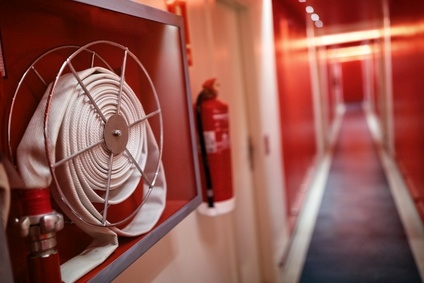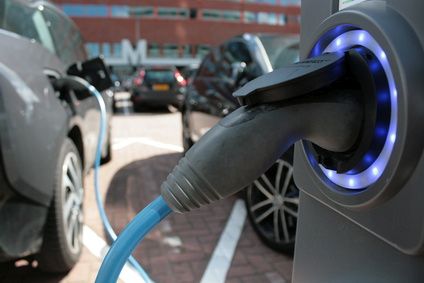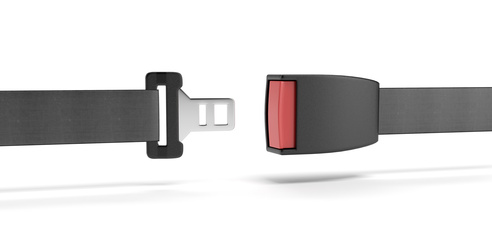CCCF: China Increases the Quality Control of Fire Protection Products
On January 5, 2016 the CCCF administration announced that the standards for fire protection products will be subject to greater verification. With view to World Consumer Rights Day on March 15, 2017, China has expressed that they will further improve the quality control of fire protection products.
Fire protection products need in China a CCCF certification. The CCCF certification is a CCC certification for fire safety products.
In Taigu County, Shanxi province began a quality check in shopping centers and major hotels.
The following points were the focus of this quality check for CCC(F) certified product for fire safety in China:
- Identification of fake fire protection products and products that are wrongly marked with the CCCF logo
- Check that all prescribed standards (GB standards) have been observed, especially in regards to emergency exit lights, fire extinguishers, extinguishing hoses, and other fire safety areas.
- Check the validity of test reports and CCCF certificates
- Check whether the on-site random sample tests were performed
During the inspections, it was emphasized that the safety of fire protection products should be explicitly tested before purchasing. For products that do not comply with national standards, the owners of the products will face legal consequences.

Are you a manufacturer of fire protection products and need a CCCF certificate for fire safety products? Please do not hesitate to contact us for further details and detailed consultation. You can contact us via email, or call us (UK: +44 2071931135, Rest of Europe: +49 69 2713769150, US: +1 773 654-2673).
For general information on CCCF, the certification process, the associated costs, or further GB standards, please visit our website.
For more additional information, please download our free booklet “CCC Made Easy” here. You may also consider our book “A Brief Guide to CCC: China Compulsory Certification”, which can be ordered directly on Amazon here.
CCC Training in Cooperation with the TÜV Academy

At the end of March 2017 we will offer you two training courses in cooperation with TÜV Academy at TÜV Süd Akademie in Munich, Germany focusing on certification rules for China. On March 29, 2017 the CCC training course “Certification Requirements and Procedures in the People’s Republic of China (CCC certification)” will take place. The next day, on March 30, 2017, we will hold another training CCC course “Certification Requirements and Procedures in the People’s Republic of China in the automotive area” aimed at the concerns of the automotive supplier and the OEM’s. Both events are organized by MPR China Certification GmbH in cooperation with TÜV Academy in Munich.
Participants will receive an overview of CCC mandatory products along with the relevant Chinese National Standards (known as GB standards) which determine which products fall under the CCC compulsory, and the corresponding CNCA Implementation Rules which describe the certification regulations. The courses will also give an overview of the Implementation Rules in accordance with the certification authority which dictate the requirements for the process of obtaining CCC certification, the marking procedures and the mandatory annual follow-up audits.
The complete CCC process, scope, planning and potential areas of difficulties will also be discussed. We strongly recommend all interested manufacturers to participate in the CCC training courses in order to better understand the actual certification process. Attendees will be better prepared and can plan accordingly to meet their deadlines without additional stress.
Participants will see examples of different product categories that require CCC certification so that they can determine if their product is subject to required certification. CCC certification may be only one of several required certifications needed to import a product into China. It is important to check if additional certifications such as CEL (China Energy Label) or NAL (Network Access License) or other certifications will also be required. These additional certifications will also be discussed during the courses.
All participants will receive a certificate issued by the TÜV Akademie for their participation in the training.
The tentative course dates for 2017 are as follows:
2017-03-29: Munich with the topic: “Certification Requirements and Procedures in the People’s Republic of China (CCC certification)”.
2017-03-30: Munich with the topic: “Certification Requirements and Procedures in the People’s Republic of China in the automotive area”.
We are also available to provide personalized In-House Training and Lectures. Just send us an email or give us a call to discuss your training needs.
If you would like more information regarding CCC certification, please visit our website. Here you can learn more about the certification process and the costs associated with certification. You will also find details regarding our certification package on our website including a general anticipated time frame. Take a look at our references section to see some of our clients and what they are saying about us. For more detailed information please download our free booklet “CCC Made Easy” here. You may also consider our book “A Brief Guide to CCC: China Compulsory Certification”, which can be ordered directly on Amazon here.
In case you have any questions, please call us at: (UK: +44 2071931135, US: +1 773 654-2673, GER: +49-69-2713769150) or just send us an email.
HAF-604: China Will Continue to be an Attractive Market for Suppliers of Nuclear Facilities and Components in the Future
According to a study by BMI Research, China could be the world’s largest producer of nuclear power by 2026, surpassing the current world leader USA.
In 2015 about 26 gigawatts of electricity were generated by nuclear power plants. Estimations show that one year later, in 2016, 34 gigawatts were generated by nuclear power plants.
It is currently estimated that nuclear energy will triple by 2026, to over 100 million kilowatts.
China declared long-term goal is to continue to become less dependent on coal and other fossil fuels. According to the International Atomic Energy Agency, China has 20 new reactors under construction as of right now, with another 176 additional reactors already being planned.
Due to the massive expansion of its nuclear power sector, China will continue to have numerous opportunities for suppliers of safety-related, nuclear components.

Foreign manufacturers will need the proper registration of their safety related products before they can ship them to China. They must have a valid HAF-604 registration before shipping.
Most manufacturers don ‘t have the expertise, contacts in China and language skills in order to prepare the necessary paperwork for a HAF-604 registration with the China National Nuclear Safety Administration (NNSA). The HAF-604 guidelines (Supervision and Management Regulations for Imported Civilian Nuclear Equipment) have been established with the goal to be able to better monitor imported safety relevant components, when used in a nuclear power plant.
China Certification Corporation assists manufacturers of equipment for nuclear power plants to obtain the HAF 604 registration successfully.
If you need more information on HAF-604, you can find more information here on our website.
Please, do not hesitate to contact us if you have any specific question. You can give a call under UK: +44 2071931135, US: +1 773 654-2673, Rest of Europe: +49-69-2713769150), or send us an e-mail .
China Cracks Down on Subsidy Fraud by Alternatively Driven Vehicle Manufacturers
The Chinese Ministry of Industry and Information Technology (MIIT) has convicted seven manufacturers of alternatively driven vehicles of subsidy fraud. This sent a clear message that these practices are not tolerated.
On February 2, 2017 MIIT published that seven manufacturers of alternatively driven vehicles (such as electric vehicles) falsely applied and received subsidies. The manufacturers had already received subsidies even though the vehicles were not yet finished or their vehicles were equipped with batteries that did not meet the given specifications.
The penalties imposed by the Ministry include that the seven car makers have been temporarily taken off of an official catalog of recommended vehicle manufacturers who are eligible for subsidies. They have two months to remedy the existing problems and come into compliance. If they comply the authorities will re-assess their entitlement. Since 2009, China has been offering subsidies for the production and distribution of electric cars, plug-in hybrids and fuel-cell cars. By the end of 2015, a total of 33.4 billion yuan (4.81 billion US dollars) of subsidies were given.
Since 2009 the requirements for car manufacturers have been increased to receive subsidies. In addition, it was stipulated that subsidies of local governments should not exceed 50 percent of the central government. Subsidies are to be phased out by the end of 2020.

A total of 517,000 alternatively driven vehicles were sold in 2016 in China. This represents an increase of 53 percent compared to the previous year. A similar growth rate is expected for 2017.China has been the world’s largest market for such vehicles since 2015.
The German automotive manufacturers also contributed to the increase. Volkswagen has announced that it will present approximately ten electric cars on the Chinese market over the next ten years. Daimler, which presented its electric concept car EQ in November 2016, has announced that the share of new vehicles in their global product line will be between 15 and 25 percent by 2025.
The MIIT published a 15-year plan for the development of alternative-powered vehicles in China in October. According to the plan, alternative-powered vehicles will be responsible for 7 percent of the total car sales in 2020 and 40 percent in 2030. In 2016 it only was 1.8 percent. The goal is to drive 300 kilometers with a single charge by 2020 and 500 km by 2030.
The enormous growth rates in this area have a huge potential.
As a result, the certification of alternatively driven vehicles such as electric cars and hybrid vehicles and vehicle components is becoming increasingly important for automotive manufacturers and automotive suppliers.
China Certification Corporation offers CCC Certification for Automotive Suppliers and Manufacturers. For manufacturers, we offer CCC Certifications and the Complete Type Approvals to enable sales of vehicles into the Chinese market.
For more information regarding CCC certification, the certification process as well as the associated costs, please visit our website.
For detailed information, please download our free booklet “CCC Made Easy” here. You may also consider our book “A Brief Guide to CCC: China Compulsory Certification,” which can be ordered directly on Amazon here.
Please do not hesitate to contact us by phone (UK: +44 2071931135, US: +1 773 654-2673, GER: +49-69-2713769150) or email us with any questions you may have.
CCC: New GB Standard, Implementation Rules and Electromagnetic Compatibility Certification Rules for Lights and Electrical Supply Track Systems for Luminaires.
On January 1, 2017 the new GB standard GB7000.1-2015 went into effect. Initially released on December 12, 2016, it replaces the previous standard GB7000.1-2007.
The GB Standard defines the mandatory product tests required for CCC certification. In this case, GB7000.1-2015 defines the tests and test procedures that ensure the Safety and Electromagnetic Compatibility Certification Rules for Lights and Electrical supply track systems for Luminaires.
Companies whose CCC certificates have been issued in accordance with GB7000.1-2007, are required to update their certificates to the new GB Standard by March 31, 2018 to remain in compliance. Certificates that have not been updated by then will be suspended, and then cancelled by the CQC (China Quality Certification Center). The update requires new product testing in China in accordance to the new GB Standard. Any new product CCC applications are only accepted if they comply with the new standards.
In the course of updating the GB Standard, the CQC also revised the corresponding CQC Implementation Rules. The new CQC Implementation Rule CQC12-465313-2016 was published on December 30, 2016 and replaces the previous Implementation Rule CQC12-465313-2010.
Implementation Rules define the CCC framework that must be implemented within an applicants’ production facility in order to qualify for CCC certification. The CQC allows a transition period to all certificate holders in order to update their CCC according to the new Implementation Rules. All certificates must be updated within one year, starting on December 30, 2016. Certificates that have not been updated will be suspended and then cancelled by the CQC.
It is important to keep in mind that these changes must be made regardless of the expiration date showing on the CCC certificate(s) to remain in compliance. As a CCC certificate holder the manufacturer agrees to do their annual follow-up audits and to stay up to date with any mandatory changes required.
Recent applicants who have applied for CCC recently do not need to worry. Only applications that are in compliance with the updated GB Standards and Implementation Rules have been accepted since the updates were published.
If you have any questions regarding the newly released GB standards, or the CQC Implementation Rules, please do not hesitate to give us a call (UK: +44 2071931135, US: +1 773 654-2673, Rest of Europe: +49-69-2713769150) or e-mail us with any questions you may have.
For regular updates on China certifications, you can always take check on our News Section, where we publish new articles several times a week.
Detailed information on CCC can be found in our free brochure “CCC made Easy” which you can download here or in our English textbook “A Brief Guide to CCC: China Compulsory Certification” which you can buy right here, on Amazon.
Taiwan Certification: Article about Taiwan Certification for Automobiles and Automotive Parts Published in “In-Compliance Magazine”
On January 31, 2017 In-Compliance Magazine published an article about the Taiwan Certification of automotive parts on its website. The article was written by Mr. Julian Busch, CEO of the China Certification Corporation and can be viewed here.
According to the article, since joining the World Trade Organization (WTO) in January of 2002 Taiwan has implemented several new regulations regarding its international trade. Most of the national Taiwanese standards established in this context are based on existing international standards from the International Standards Organization (ISO) and the International Electrotechnical Commission (IEC).
Mr. Busch describes how the systems for certifications and the responsible authorities have been set for the certification of vehicle components. The vehicle components affected by the Taiwan Certification are primarily those which are also covered by the European ECE standards. These include, but are not limited to interior trim components of vehicles, seats and headrests, fuel tanks and seatbelt systems.
In detail, the article describes the necessary steps to obtain the Taiwan Certification. The certification process is complex. Certifications in the automotive sector are carried out by the Vehicle Safety Certification Center (VSCC). Its task is to test and ensure the safety of the vehicles on the Taiwan market. A number of documents, and forms need to be completed and submitted in the process. Once accepted, specific tests are carried out on samples provided by the manufacturer in accordance with the Taiwanese test standards (“Vehicle Safety Testing Directions”). The tests are done by either the VSCC or other accredited test laboratories in Taiwan.
Factory inspections have also been mandatory for automotive suppliers to ensure product conformity. Once a manufacturer has successfully obtained the Taiwan Certification, many competitive advantages are achieved, and certified products can be sold directly on the Taiwan market. New automotive products can also be certified much more easily after a manufacturer is registered with the VSCC.
Are you interested in the certification of products and automobile components for the Taiwanese market? Then do not hesitate to contact us.
- We will check whether your product(s) require certification
- We offer a non-binding quote for the Taiwan Certification
- We accompany you through the entire certification process. We take over all communications with the Taiwanese authorities, provide advice on how to fill out application documents, handle product tests in Taiwan, and provide support when applying for the approval label.
- We pay all application and test fees to the Taiwanese authorities
- We ensure that the certification process runs as smoothly and minimize your work load.
Of course, we are able to answer any questions you may have regarding the Taiwan Certificate. Send us an email or call us and we will be pleased to assist you.
UK: +44 2071931135, Rest of Europe: +49-69-2713769150, US: +1 773 654-2673
Jaguar Land Rover Recalls Vehicles in China
Jaguar Land Rover will start a recall of 6,439 vehicles in China. The reason for the recall is to replace defective safety belts, which reportedly may not work properly in the event of an accident. As you can read in our previous news, safety belts in China are assigned as a top high priority.
According to the Chinese authorities of the AQSIQ (General Administration of Quality Supervision, Inspection and Quarantine), the following Jaguar Land Rover vehicles are affected by the default safety belts.
- 1554 Range Rover vehicles imported between 2016 and 2017
- 3438 imported Range Rover Sport Series, which were produced between 12/07/2016 – 26/10/2016
- 1132 Jaguar XE vehicles which were produced between 13/07/2016 – 07/12/2016 and imported into China in 2017
The car manufacturer stated immediately that all the vehicles concerned are going to be inspected. Defective components will be replaced free of charge. Each vehicle that has been repaired will be logged into the Jaguar database in order to ensure that all affected vehicles are properly fixed.

With the support of MPR China Certification GmbH and China Certification Corporation, many manufacturers have successfully mastered the “CCC certification” hurdle, including the market leaders in the field of safety belts for motor vehicles. If you are interests in more information on CCC certification please do not hesitate to contact us. Just send us an e-mail or give us a call UK: +44 2071931135, US: +1 773 654 2673, EUR: +49-69-2713769150.
You can find more information on CCC certification, the process and associated costs, on our website. For more detailed information, please download our free booklet “CCC Made Easy” here. You may also consider our book “A Brief Guide to CCC: China Compulsory Certification”, which can be ordered directly on Amazon here.
China is a Sales Guarantor for German Automotive Manufacturers
The Chinese automotive market has become increasingly important for German automotive manufacturers in recent years. Ernst & Young reported that in the year 2016 approximately 34 percent of the world-wide passenger car sales by the German automobile manufacturers Volkswagen, Daimler and BMW were made in China. In 2015, the share was 30 percent and five years earlier it was only 22 percent.
Especially for Volkswagen, the Chinese market is extremely important since almost four out of ten cars are sold in China. Whereas, the share of BMW and Daimler is about 22 percent. The three German car companies were able to increase their sales by 13 percent last year on the Chinese market. Worldwide BMW, Daimler and Volkswagen increased their sales by a substantial 5 percent. Over the past eight years, the Chinese automotive market has developed into a sales guarantor for German automotive manufacturers. They were able to increase sales of 1.6 million vehicles in 2009 to 5 million in 2016.
In addition, Ernst and Young projected that China will continue to be the world’s largest automotive market. China will remain the most important growth market for German automotive manufacturers. Although the market in China is not yet saturated, slightly weaker growth is expected in 2017.
One reason for the lower projected growth is the reduction in tax concessions for small cars. As recently published, the concessions were reduced by 50%. Also the accumulated overcapacity of the Chinese automobile manufacturers could be a problem. If the sales figures slow down, dealers may decide to reduce inventory by lowering prices substantially. By doing so this would create a buyers’ market allowing people who could not previously afford cars to buy domestic brands trying to compete with a lower price than normal. However, it is not likely that a decline in sales in the luxury class will take place since the German vehicles are still a status symbol.
MPR China Certification GmbH and China Certification Corporation offers CCC Certification for Automotive Suppliers and Manufacturers. For manufacturers we offer CCC Certifications and the Complete Type Approvals (including emission and fuel consumption test) to enable sales of vehicles into the Chinese market.
For more Information about CCC certification, the certification process and the costs associated with CCC certification please check our website.
For more detailed information, please download our free booklet “CCC Made Easy” here. You may also consider our book “A Brief Guide to CCC: China Compulsory Certification”, which can be ordered directly on Amazon here.
Please do not hesitate to contact us by phone (UK: +44 2071931135, US: +1 773 654-2673, Rest of Europe: +49-69-2713769150) or email us with any questions you may have.
Less Accidents Expected by 2025 Due to Connected Mobility
According to a joint study (“Connected Car Effect 2025”) by the automotive supplier Bosch and the consultancy company Prognos, the increasing networking of vehicles will lead to a significant decline in the number of accidents by 2025. This expectation is based on the assumption that by 2025 a large proportion of the cars on the road will be connected to the Internet and have special assistance systems which can intervene in dangerous situations.
According to the study, 260,000 injuries could be prevented annually in Germany, the USA and China. Over 11,000 lives could be saved in 2025 through connected assistance systems, including about 300 in Germany (USA: 4000, China: 7,000). In China traffic accidents with death are becoming more and more frequent due to the increasing traffic density. Technical solutions, such as the networking of vehicles, for the saving of human life have great potential.
Network solutions expected to be widely implemented by 2025 include ESP anti-skid (up to 90 percent of all vehicles in the three countries), as well as sensor based emergency braking and tracking assistants (up to 40 percent). In addition, connected mobility would also have an impact on fuel consumption and emissions. Concepts such as “community-based parking” and active parking space management could reduce the search traffic by up to 380 million kilometers. According to the authors of the study, highly automated driving also saved fuel.
As reported in our News previously, the Chinese automotive market is of great importance for the German car manufacturers. Chinese customers are enthusiastic about technology, so premium car manufacturers need to be aware of international competition with digital equipment and networking of vehicles.
The huge potential of the Chinese automobile market strengthens the OEM’s as well as the automotive supplier network. Many different types of automotive parts are required to have CCC certification. It is important to check if CCC is needed to avoid problems.
For more Information about CCC certification, the certification process and the costs associated with CCC certification please check our website. For more detailed information, please download our free booklet “CCC Made Easy” here. You may also consider our book “A Brief Guide to CCC: China Compulsory Certification”, which can be ordered directly on Amazon here.
Please do not hesitate to contact us by phone (UK: +44 2071931135, US: +1 773 654-2673, Rest of Europe: +49-69-2713769150) or e-mail us with any questions you may have.


